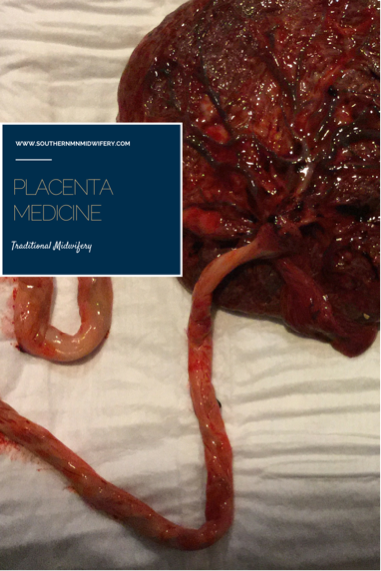The Short
All families at Southern Minnesota Midwifery receive a placenta tincture after the birth of their baby- it is included in your care. If you are interested in capsules as well, encapsulation services are offered for a small fee (this fee covers supplies needed for encapsulation and the time involved for whomever is doing the encapsulating). Potential benefits of ingesting your placenta after birth:
Thoughts
When I first began my midwifery program, I was required to attend a workshop on Placenta Medicine at Midwives College of Utah. The description of placenta medicine- it's process, creation to consumption- made me squeamish (as did the hands-on, interactive demonstration of creating the medicine itself). The explanation of the medicine's purpose however, peaked my interest. Here is what I was taught:
Sometime near the beginning of the second trimester of pregnancy, the placenta becomes our body's primary producer of hormones and our endocrine system goes into a sort of "stand-by mode". After birth, when the placenta is gone from our body, our hormones (their secretion and regulation) go through a process of change- our bodies begin to make milk and our endocrine system, once again, takes over full production of our hormones. Placenta medicine acts like a kind of "hormonal crutch", as our bodies acclimate to a non-pregnant and lactating state.
A doula at the time, I went where I always go for more information: Moms. A handful of veterans (women who have had at least one baby) were willing to experiment and agreed to allow me to encapsulate their placentas in exchange for their brutally honest feedback. The information they gave about their experience was fun and surprising- no one could believe how different they felt after taking their placenta capsules. The mamas reported more energy than with their previous postpartum experiences, less severe mood swings and just a general and overall sense of well-being. All four of us were convinced: "Ick Factor" aside, ingesting one's placenta appears to be beneficial.
In Closing
At some point in your prenatal care, I will ask about your plans for your placenta. Feel free to ask as many questions as you'd like, and consider reaching out to other families to see what their experiences have been.
Further Reading
Website: http://placentabenefits.info/medicinal.asp
Blog Post: http://bloomablog.com/straight-talk-placentas-encapsulate/
Print: Placenta: The Gift of Life http://www.midwiferytoday.com/books/placenta.asp
MN Encapsulators: http://www.minnesotaplacenta.com/find-a-provider.html
FAQ
I am often asked if I am willing to encapsulate placentas of women who are not in my care. The answer is "yes", but I do require a copy of your lab work, from your pregnancy care provider.
All families at Southern Minnesota Midwifery receive a placenta tincture after the birth of their baby- it is included in your care. If you are interested in capsules as well, encapsulation services are offered for a small fee (this fee covers supplies needed for encapsulation and the time involved for whomever is doing the encapsulating). Potential benefits of ingesting your placenta after birth:
- Increased energy
- Quicker involution of the uterus
- Quicker cessation of postpartum bleeding
- Increased milk supply
- Mood stabilization
Thoughts
When I first began my midwifery program, I was required to attend a workshop on Placenta Medicine at Midwives College of Utah. The description of placenta medicine- it's process, creation to consumption- made me squeamish (as did the hands-on, interactive demonstration of creating the medicine itself). The explanation of the medicine's purpose however, peaked my interest. Here is what I was taught:
Sometime near the beginning of the second trimester of pregnancy, the placenta becomes our body's primary producer of hormones and our endocrine system goes into a sort of "stand-by mode". After birth, when the placenta is gone from our body, our hormones (their secretion and regulation) go through a process of change- our bodies begin to make milk and our endocrine system, once again, takes over full production of our hormones. Placenta medicine acts like a kind of "hormonal crutch", as our bodies acclimate to a non-pregnant and lactating state.
A doula at the time, I went where I always go for more information: Moms. A handful of veterans (women who have had at least one baby) were willing to experiment and agreed to allow me to encapsulate their placentas in exchange for their brutally honest feedback. The information they gave about their experience was fun and surprising- no one could believe how different they felt after taking their placenta capsules. The mamas reported more energy than with their previous postpartum experiences, less severe mood swings and just a general and overall sense of well-being. All four of us were convinced: "Ick Factor" aside, ingesting one's placenta appears to be beneficial.
In Closing
At some point in your prenatal care, I will ask about your plans for your placenta. Feel free to ask as many questions as you'd like, and consider reaching out to other families to see what their experiences have been.
Further Reading
Website: http://placentabenefits.info/medicinal.asp
Blog Post: http://bloomablog.com/straight-talk-placentas-encapsulate/
Print: Placenta: The Gift of Life http://www.midwiferytoday.com/books/placenta.asp
MN Encapsulators: http://www.minnesotaplacenta.com/find-a-provider.html
FAQ
I am often asked if I am willing to encapsulate placentas of women who are not in my care. The answer is "yes", but I do require a copy of your lab work, from your pregnancy care provider.


 RSS Feed
RSS Feed
